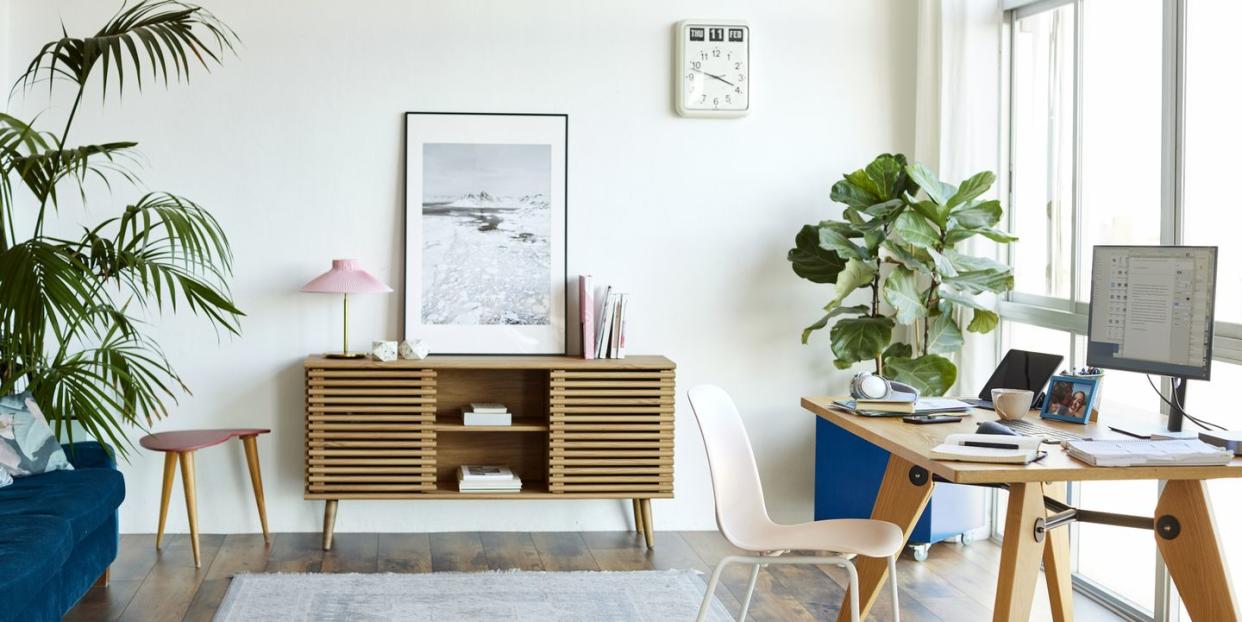Struggling to Focus in Your Home Office? We Spoke With an Expert to Learn Why

“Hearst Magazines and Verizon Media may earn commission or revenue on some items through the links below.”
It's common to bring work home with us—whether we stack the priorities in our minds or physically dump files on our kitchen tables. Now, working from home is the only option for many as a result of the pandemic. In the past, we've shared with you the best ways to optimize your space to craft a home office (we repeat: your bed is not a desk), our favorite desks for small spaces, and even great ideas to boost productivity. But in case you still can't seem to focus, we spoke to a psychiatrist, Dr. Mimi Winsberg of Brightside Health Association, about the blurred lines and distractions while working from home. Even better: we learned actionable ways to get your tasks done and let your work to-do lists go when your shift is over.
At-home Factors That Make It Difficult to Focus
Distractions: family, ambient noise, looming house chores
Blurring of boundaries
Lack of rituals
So many distractions can potentially arise while you're working from home: your kids bursting into your office requesting lunch, your cat's never-ending duel with your house plants, your neighbor finding the inspiration to mow their lawn during your phone call—it's a pretty exhausting cycle.
Dr. Winsberg shares that the blurring of boundaries between one's professional life and personal goings-on is one of the biggest causes behind a lack of focus. "Some workers are getting things done on a Saturday because the week before, they had to finish laundry in the middle of the day," says Dr. Winsberg.
Another huge component to acknowledge is that not everyone has a designated space to work in their home.

Is Your Screentime Affecting Your Body?
Zoom fatigue is real, and taking a majority of your morning and nights to comb through emails strains your eyes. According to optometrist Dhruvin Patel, founder of Ocushield, blue light (which is harmful to your peepers) comes primarily from the sun, but can also be found in the products we use daily—from digital screens such as phones, laptops, and monitors. But it also comes from unsuspecting places, such as some lighting fixtures (including the bulbs in your fridge). "Bear that in mind next time you reach for a midnight snack," he cautions.
Dermatologist Dr. Hadley King suggests using SPF and screen protectors that block blue light, which can also wreak havoc on your skin—which means yes, you should apply sunscreen even while you're at home. "HEV light penetrates into the lower layers of the dermis. It is not associated with skin cancer like UV rays are, but it can cause skin to age prematurely (photo-aging). It can also contribute to hyperpigmentation and may play a part in melasma and age spots, like UV rays, HEV light generates free radicals, or reactive oxygen species," Dr. King explains. "These free radicals cause skin cells to produce enzymes that break down collagen and elastin in the skin."
And even if you're a night owl, the increased screen time can take a toll due to lack of sleep and increased exposure to blue light.
How Long Can You Focus?
Realistically, while your workday can run from 8 to 10 hours, high-quality work can be done for about five hours a day. "It's better if you can optimize those five hours, taking breaks in between, rather than sitting in front of a laptop for ten hours and not being productive for most of that time," says Dr. Winsberg.
It's best to think of your to-do list and prioritize what needs to get done. "I like to break things down into the kinds of work that they are. Some are menial—things that don't require much brainpower. Where the things that need dedicated focus, I will slot in the time that I know I'm productive," Dr. Winsberg says. Figure out when your motivation is high and when it isn't!
After you're done with a huge task, stand up, take a break, and stretch. The lull that naturally comes after lunch can be combated with an activity that doesn't require all of your attention. "People like to talk about how much 'willpower' they have. We all have fluctuating levels of willpower, so you want to capitalize on the moments where it's really high to do the hard things," Dr. Winsberg explains.
Another tip? Engaged with your screen as if you're working in person. We're staring at screens for more hours in the day than we have ever before. Dr. Winsberg suggests looking away from your screen and taking a moment to think or gaze at a beautiful picture, to give your eyes a chance to readjust. "It's good to emulate that natural shifting gaze you have when in conversation."
Dr. Winsberg adds, "Prioritize tasks not just based on urgency, but also on complexity. Take breaks between hard efforts in order to not spin your wheels. Calendaring time slots for work projects, the way you would a meeting, can help."
Change Your Environment
Your productivity stays higher when you change up your work environment every now and then. "I advise that people do just a little bit of rearranging every three months. It might just be changing the angle of your desk or getting a new plant," Dr. Winsberg explains. Subtle shifts can help maintain the freshness of the space without requiring a huge renovation to your home.
It's tough to be hunched over your laptop in a dim, cluttered area. Natural lighting and good ergonomics can help with focus. "Find a dedicated space, ideally with a door the closes and reserve that space if possible," Dr. Winsberg advises. Don't have a door? We have a list of innovative office ideas that will inspire you to rethink tricky spaces.
"Make the most out of your time. Start your day with a ritual of sorts that's not work-related," Dr. Winsberg continues. "The temptation is to roll out of bed and head right into work." After you hit snooze for the third or fifth time (judgment-free zone), go on a walk! Or cook yourself the best breakfast omelet. Maybe nestle into your reading nook to finally get to that last chapter. Do something that keeps your heartbeat steady, stress low, and eyes fixed on all the positive possibilities of the new day.
Responsibly Clocking Out
To set a clear separation between work and home life: log off and stay off. Respect the boundaries that you set so everyone (your family, housemates, or coworkers) will adhere to the standards you set for yourself. As Dr. Winsberg explains, "set a framework of your expectations. Make family members or roommates aware of your schedule, so that they know when to not interrupt. Also, set a guideline on how those interruptions should happen."
"End each day with another ritual, ideally a walk outside, exercise, or mindfulness session to transition from work mode to home life," she continues. Cheers to the weekend and finally, a hopeful Monday.
"We've seen anxiety levels really increase during the pandemic. Forty percent of Americans are reporting anxiety at this time because there is so much uncertainty in life right now. Working alone from home can create some anxiety, too," says Dr. Winsberg. Difficulty concentrating can be a symptom of anxiety and depression. Take a free assessment at Brightside today and reach out if you need help seeking treatment.
Below, we've included the best ergonomic office lifesavers to help your workflow. There's even an adjustable standing desk that has a tech-savvy outlet and 2 USB portals. Keep your office door closed and your mind open to endless possibilities.
You Might Also Like

